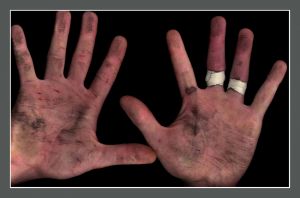A quiet title action is often filed to establish adverse possession in real property once a claimant has established the five elements, including payment of property taxes. In a recent decision, a pair of professional adverse possessors- they did this for a living- recorded a wild deed so that the true owners would not get the tax bills, which resulted in the owners not paying taxes. The fiendish pros paid the taxes, and filed a quiet title based on their adverse possession. They got a big surprise when they were trumped by the unclean hands defense – recording the deed was wrongful, and their unclean hands got them thrown out of court.
 In Aguayo v.Amaro, Herman and Isabel bought a home in 1946. They had three children. Herman died in 1969, and Isabel passed in 1969, without a will. Sofia & Jesus, unrelated to the deceased, were in the business of acquiring properties by adverse possession. They had filed 10 lawsuits to quiet title by adverse possession. In 1995 Sofia sent a letter to the deceased asking whether she could buy the property. Sofia claims that she heard from Isabel’s son, and he orally agreed to sell the property for $25,000. The son then died.
In Aguayo v.Amaro, Herman and Isabel bought a home in 1946. They had three children. Herman died in 1969, and Isabel passed in 1969, without a will. Sofia & Jesus, unrelated to the deceased, were in the business of acquiring properties by adverse possession. They had filed 10 lawsuits to quiet title by adverse possession. In 1995 Sofia sent a letter to the deceased asking whether she could buy the property. Sofia claims that she heard from Isabel’s son, and he orally agreed to sell the property for $25,000. The son then died.
Jesus, the adverse possessor, placed a no trespassing sign on the property, changed the locks, and claims to have made repairs. Jesus claims he then made a loan of $2,000 to another brother of the deceased, and they entered a sale and rental agreement (apparently all in Jesus’ handwriting). In 2000, Jesus then recorded a wild deed, from Jesus Duran (unrelated) to Jesus and Sofia. Jesus Duran was a made-up name and had no interest in the property. As a result of the deed, the brother stopped getting the County property tax bills, and Sofia got them. That way the true owners did not pay attention to getting the tax paid, and Sofia paid the taxes. In 2006 they filed suit to quiet title by adverse possession.
UNCLEAN HANDS The defense of unclean hands is based on the equitable maxim that one who comes into equity must come in with clean hands. “Equity” is a court proceeding based more on fairness than on a strict interpretation of the law. The doctrine requires the plaintiff to act fairly in the matter in which he seeks a remedy. A quiet tile action is equitable in nature, so the equitable maxims all apply. In a quiet title action, if the wrongful conduct is directly related to the cause, the unclean hands defense applies.
ADVERSE POSSESSION
Adverse possession requires proving five elements:
(1) possession under claim of right (claiming a right to use the property, though not founded on a written instrument; the claim need not be based on a good faith belief in the title), or color of title (a written or deeded easement, though it may be incorrect or in the wrong location) ;
(2) The claimant must occupy or utilize the land in a way (actual, open, and notorious) that constituting reasonable notice to the true owner;
(3) possession which is adverse and hostile to the true owner;
(4) continuous possession for at least five years; and
(5) payment of all taxes which were assessed against the property during the five-year period.
 Sofia argued that, claiming adverse possession under a claim of right, requires the wrongful possession of real property, unclean hands cannot be a defense. Possessing property under a claim of right means the possessor is a trespasser, with out any bona fide belief in his title. Wrongful possession equals unclean hands, so there could never be an adverse possession. She is right- the historical doctrine allows one who takes by “bow and spear” and holds for the statutory period, to take title.
Sofia argued that, claiming adverse possession under a claim of right, requires the wrongful possession of real property, unclean hands cannot be a defense. Possessing property under a claim of right means the possessor is a trespasser, with out any bona fide belief in his title. Wrongful possession equals unclean hands, so there could never be an adverse possession. She is right- the historical doctrine allows one who takes by “bow and spear” and holds for the statutory period, to take title.
However, the court said that it was not her wrongful possession that was the problem. It was the deceitful act of recording the wild deed for the purpose of diverting the tax bills to her address. The court found that the sole purpose of recording the deed was to interfere with the true owner’s payment of property taxes. This evil act was directly related to her claim, as. By filing the wild deed and diverting the tax bills, she was able satisfy element number 5 -payment of all taxes assessed against the property for five years.
Its hard to believe that this couple made adverse possession their life’s work, and apparently had gotten away with it for a while. Here, the court reached a great result by focusing what was the most egregious of their acts, recording the wild deed to divert the tax bills.
Photos: http://www.sxc.hu/photo/173798
http://tinyurl.com/kqveu8n
 California Real Estate Lawyers Blog
California Real Estate Lawyers Blog

